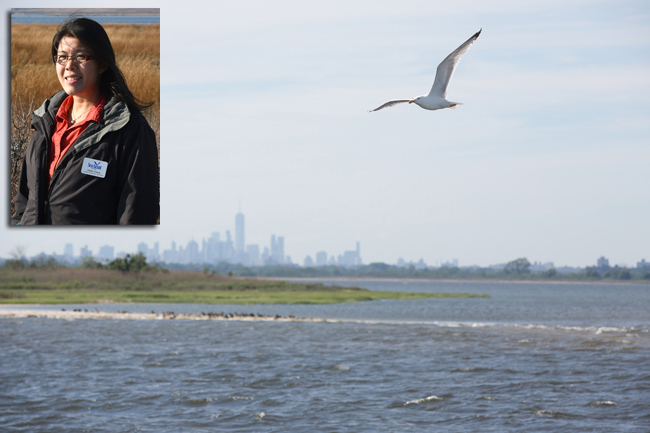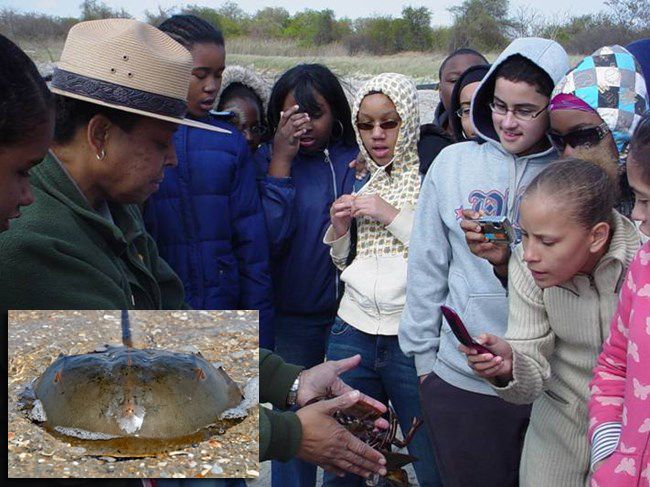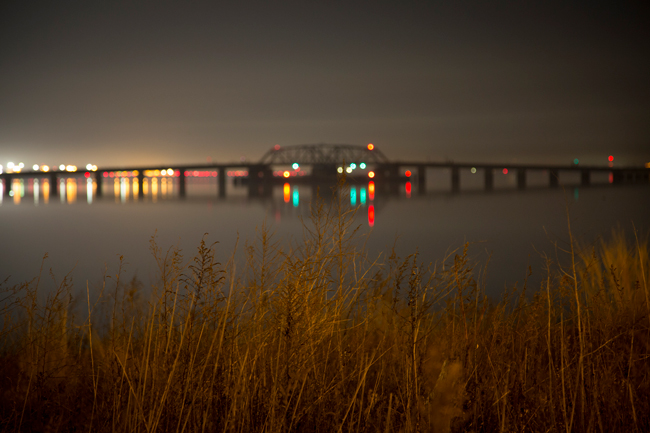
(Inset) New York Sea Grant’s Coastal Resilience Extension Specialist Helen Cheng offers a new podcast series on Jamaica Bay, a heavily urbanized and densely populated watershed situated within the New York City boroughs of Brooklyn and Queens, with portions in the east falling within Nassau County on Long Island. Credit: Helen Cheng; (inset) Cornell University Photography/Diane Bondareff.
Contacts:
Helen Cheng, NYSG's Coastal Resilience Extension Specialist, E: helen.cheng@cornell.edu P: (718)-951-5415
Brooklyn, New York, August 22, 2018 - Tens of thousands of people arrive and depart daily from John F. Kennedy Airport and fly over Jamaica Bay, a watershed that isn’t often thought of as the rich cultural and environmental resource that it really is.
To get the word out about Jamaica Bay, which is home to nearly 3 million people, New York Sea Grant’s Coastal Resilience Extension Specialist Helen Cheng created the ‘Jamaica Bay’ podcast series, a collection of stories featuring the people that work, live, and play in Jamaica Bay, New York City.

Since April 2017, each episode has explored a different aspect of Jamaica Bay, ranging from water quality (mp3) to the horseshoe crabs (mp3) found in the bay.
The show’s most recent episode, The Rockaway Peninsula, shares perspectives of the people who live on the narrow strip of land that shelters Jamaica Bay from the Atlantic Ocean.
- Episode 6:The Rockaway Peninsula (July 2018) (Transcript | PDF)
If you don't see the player above, it's because you're using a
non-Flash device (eg, iPhone or iPad). You can download the mp3 file by clicking here (mp3). It may take a few minutes to download, so please be patient.
Each episode, which is hosted by Cheng, features a story about Jamaica Bay whether it’s from a researcher doing work in Jamaica Bay or locals who live and play in and along the shorelines of Jamaica Bay.

Episode 5 in Cheng's podcast series focuses on horeshoe crabs, which have existed and remained unchanged for more than 450 million years – that means they've been around since the age of the dinosaurs. Here, students take a look at a horseshoe crab that's come ashore in the Jamaica Bay region. Credit: National Park Service. (Inset) Atlantic horseshoe crab. Credit: M. Hedin/Flickr.
Cheng was inspired by narrative podcasts produced by National Public Radio and the "Sea Grant Files," a podcast produced by Minnesota Sea Grant. The combination of narrative and science has created a compelling platform to tell scientifically-informed stories.
Cheng appreciates the podcast as a medium for science outreach.
“Podcasts are great for communicating stories about people and science," she said. "It allows for an intimate interaction in the form of audio with the listener and gives them the opportunity to ‘hear’ Jamaica Bay and understand what life is like in Jamaica Bay. Paper material can only go so far to create that connection with the audience.”
The result has been inspirational. Kids listening to the show can get a feel for career paths, exploring what different aspects of scientific research sound like in practice.
“I’ve been told by one young listener that the show inspired them to become an oceanographer,” said Cheng.
The Jamaica Bay podcast is produced by Science and Resilience Institute at Jamaica Bay and New York Sea Grant. Episodes can be found at nyseagrant.org/jamaicabay and www.srijb.org/jbpodcast.

Credit: Cornell University Photography/Jason Koski.
More Info: New York Sea Grant and SRIatJB
The Science and Resilience Institute @ Jamaica Bay (SRIJB) is a research center focused on enhancing environmental, social, and economic resilience in communities of Jamaica Bay funded by the Rockefeller Foundation and the City of New York.
New York Sea Grant (NYSG), a cooperative program of Cornell University
and the State University of New York (SUNY), is one of 33 university-based
programs under the National Oceanic and Atmospheric Administration’s
National Sea Grant College Program.
Since 1971, NYSG has represented a statewide network of integrated
research, education and extension services promoting coastal community
economic vitality, environmental sustainability and citizen awareness
and understanding about the State’s marine and Great Lakes resources.
Through NYSG’s efforts, the combined talents of university scientists
and extension specialists help develop and transfer science-based
information to many coastal user groups—businesses and industries,
federal, state and local government decision-makers and agency managers,
educators, the media and the interested public.
The program maintains Great Lakes offices at Cornell University, SUNY
Buffalo, SUNY Oswego and the Wayne County Cooperative Extension office
in Newark. In the State's marine waters, NYSG has offices at Stony Brook
University in Long Island, Brooklyn College and Cornell Cooperative
Extension in NYC and Kingston in the Hudson Valley.
For updates on Sea Grant activities: www.nyseagrant.org has RSS, Facebook, Twitter, and YouTube links. NYSG offers a free e-list sign up via www.nyseagrant.org/nycoastlines for its flagship publication, NY Coastlines/Currents, which is published quarterly. Our program also produces an occasional e-newsletter,"NOAA Sea Grant's Social Media Review," via its blog, www.nyseagrant.org/blog.